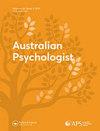Group supervision is a distinct supervisor competency: empirical evidence and a brief scale for supervisory practice
IF 2
4区 心理学
Q2 PSYCHOLOGY, MULTIDISCIPLINARY
引用次数: 0
Abstract
ABSTRACT Objectives There is strong endorsement of competency-based frameworks for practitioner training and widespread use of group supervision in practitioner training. However, there has been little effort made to understand the components and anatomy of group supervision, or efforts made to evaluate its efficacy. The current study investigates the nature and extent to which abilities and skills within individual and group supervision are similar or distinct from each other. Method A total of 98 supervisees, across 21 groups, evaluated individual and group supervisor competence of their supervisors (N = 11) using the Supervision Evaluation and Supervisor Competence Scale. Results Hierarchical cluster analysis revealed that group supervision emerged as a distinct and independent cluster to individual supervision competencies. Additionally, supervisors were rated higher on individual than group supervision competencies. Conclusion Group supervision should be considered a distinct competency requiring specific skills and therefore would likely benefit from specialised training to deliver competent group supervision. These preliminary results have implications for supervisor training, as well as clinical training programs in Australia and abroad who use group supervision as a form of clinical training. Key Points What is already known about this topic: Competency-based supervisory approaches are supported by regulatory authorities. The evaluation of competent group supervision has received inadequate research attention. There are no available measures of group supervision to evaluate supervisor competence. What this paper adds: First experimental exploration that establishes group supervision as a distinct competency in clinical supervision. Compared to individual supervision, supervisors were rated lower on group supervision competence and may require specialised training. A scale is included in the appendix for evaluation of both individual and group supervision competencies.团队监督是一种独特的监督能力:经验证据和监督实践的简要尺度
摘要目标从业者培训的基于能力的框架得到了强有力的认可,团队监督在从业者培训中得到了广泛应用。然而,很少有人致力于了解小组监督的组成部分和解剖结构,也很少有人努力评估其疗效。目前的研究调查了个人和团队监督中的能力和技能彼此相似或不同的性质和程度。方法对21组98名被督导人员进行了个体和群体督导能力评价(N = 11) 采用监理评价量表和监理能力量表。结果层次聚类分析表明,群体监督是个体监督能力的一个独立的、独特的聚类。此外,主管在个人监督能力方面的评分高于小组监督能力。结论团队监督应被视为一种独特的能力,需要特定的技能,因此可能受益于专业培训,以提供胜任的团队监督。这些初步结果对主管培训以及澳大利亚和国外的临床培训项目具有启示意义,这些项目将小组监督作为临床培训的一种形式。关键点关于这个主题已经知道的内容:基于能力的监督方法得到了监管机构的支持。对胜任小组监督的评价研究关注不足。没有可用的团体监督措施来评估监督员的能力。这篇论文补充道:第一次实验探索,将小组监督确立为临床监督的一种独特能力。与个人监督相比,监督人员在集体监督能力方面的评分较低,可能需要专门培训。附录中包含了一个量表,用于评估个人和团队的监督能力。
本文章由计算机程序翻译,如有差异,请以英文原文为准。
求助全文
约1分钟内获得全文
求助全文
来源期刊

Australian Psychologist
PSYCHOLOGY, MULTIDISCIPLINARY-
CiteScore
3.70
自引率
5.30%
发文量
32
期刊介绍:
The Australian Psychologist is the official applied practice and public policy journal of the Australian Psychological Society. As such, the journal solicits articles covering current issues in psychology, the science and practice of psychology, and psychology"s contribution to public policy, with particular emphasis on the Australian context. Periodically, Australian Psychological Society documents, including but not limited to, position papers, reports of the Society, ethics information, surveys of the membership, announcements, and selected award addresses may appear in the journal.
 求助内容:
求助内容: 应助结果提醒方式:
应助结果提醒方式:


